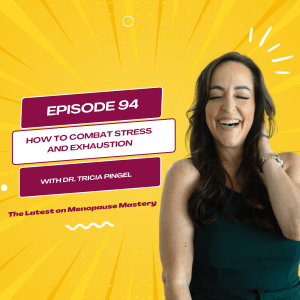Managing Menopausal Stress: Insights From Dr. Tricia Pingel
From workplace challenges to family demands, life’s pressures can leave us feeling overwhelmed, and stress has a significant impact on both our mental and physical health. In this episode of the Menopause Mastery podcast, Dallas Nutritionist Dr. Betty Murray and Dr. Tricia Pingel explore the relationship between stress, cortisol, and overall well-being. Their discussion offers valuable insights for anyone seeking to manage stress and live a more balanced life.
How Stress and Cortisol Affect Your Body
Stress is not just an emotional state; it has a deep biological impact. Cortisol, our body’s primary stress hormone, is released when we encounter stressors—whether they’re immediate threats or everyday challenges like deadlines. Dr. Pingel uses a simple analogy: facing a bear triggers a “fight or flight” response, but in modern life, constant stress can keep us in this heightened state, leading to various health problems over time.
Finding Balance Between Your Nervous Systems
The body’s stress response involves two systems: the sympathetic (fight or flight) and the parasympathetic (rest and digest). When stress dominates, the sympathetic system becomes overactive, contributing to conditions like heart disease, diabetes, and immune system problems. Drs. Murray and Pingel emphasize the importance of balancing these systems to support long-term health and reduce the risks associated with chronic stress.
Understanding Your Stress Threshold
Not everyone experiences stress in the same way. Dr. Murray discusses the concept of a “stress threshold,” which varies based on genetics and environment. Knowing your own threshold can help you develop personalized strategies for stress management. What works for one person may not work for another, so it’s essential to tailor your approach to suit your individual needs.
Nutrition and Supplements: Key Tools in Stress Management
Nutrition plays a foundational role in supporting the body during stressful times. Dr. Pingel highlights the importance of nutrient-dense foods for managing cortisol levels and adrenal function. A diet rich in vitamins, minerals, and whole foods can provide the energy needed to combat stress.
Additionally, high-quality, individualized supplements can be valuable for managing stress and hormone imbalances, but it’s important to consult a healthcare provider to create a regimen tailored to your needs.
Self-Care and Mindset: More Than Just Pampering
Self-care goes beyond indulgent activities like taking a bubble bath—it involves intentional choices that nurture both mind and body. Dr. Pingel encourages simple, mindful practices like walking, taking breaks, and expressing gratitude.
By focusing on self-care and maintaining a present mindset, you can significantly reduce stress and improve your overall well-being. This shift in perspective also involves embracing life’s imperfections and letting go of the pressure to be perfect.
Four Pillars of Stress Management
- Nutrition: Prioritize fruits, vegetables, lean proteins, and whole grains to stabilize blood sugar and support adrenal health.
- Movement: Regular exercise—whether it’s walking, yoga, or dancing—helps release endorphins, natural mood boosters that combat stress.
- Supplementation: Consider high-quality, personalized supplements to support your body, but aim to reduce reliance on them over time by improving diet and lifestyle.
- Mindset: Practices like mindfulness, meditation, and gratitude help shift your focus from stress to positivity.
A Holistic Approach for Lasting Well-Being
Dr. Pingel emphasizes that managing stress requires more than quick fixes. A holistic approach, which includes nutrition, exercise, mindset, and possibly supplements, is the key to lasting health. By addressing stress on multiple levels, you can improve your overall quality of life and boost your resilience against future stressors.
Take the first step toward nourishing your body and mind, and subscribe to the Menopause Mastery podcast for more expert insights on navigating life’s transitions.

